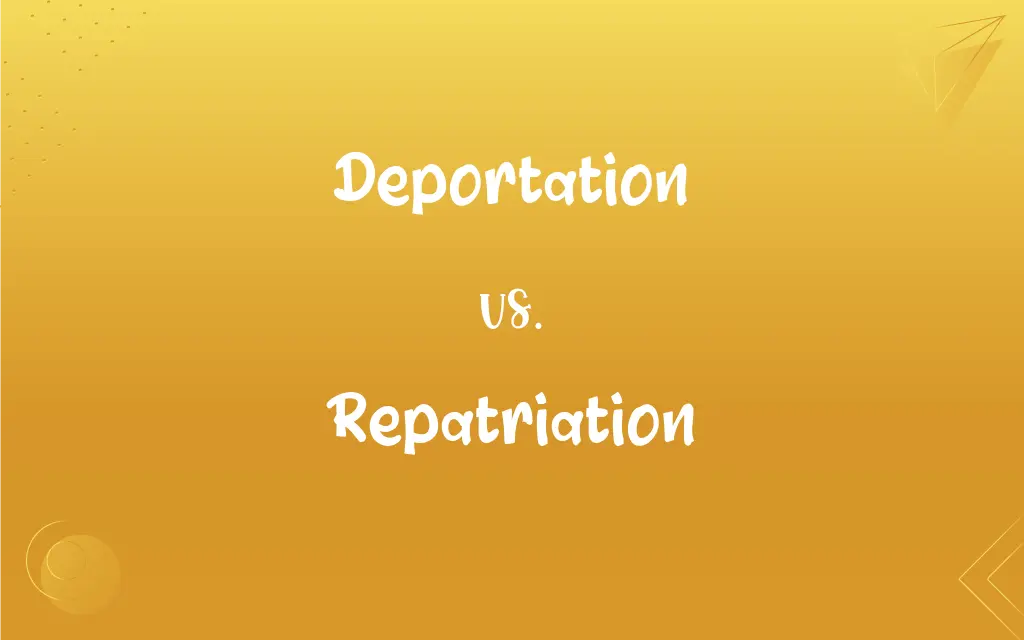Deportation vs. Repatriation: What's the Difference?
By Janet White & Harlon Moss || Updated on May 23, 2024
Deportation is the forced removal of a person from a country, typically for legal reasons, while repatriation is the voluntary or assisted return of someone to their home country, often for humanitarian reasons.

Key Differences
Deportation involves the legal process of expelling a person from a country. This usually occurs when the individual has violated immigration laws or committed crimes. Deportation is often seen as punitive, emphasizing legal enforcement and public safety. Repatriation, on the other hand, refers to the process of returning a person to their country of origin. This can be voluntary or assisted, often driven by humanitarian reasons, such as during conflicts or natural disasters. Repatriation is generally considered a supportive action to help individuals return home safely.
While deportation is mandatory and enforced by authorities, repatriation is typically a voluntary process. Individuals facing deportation have limited choice in the matter, whereas those involved in repatriation often have a say in their return.
In deportation, the individual is removed from the host country without necessarily having requested to return home. Conversely, repatriation often involves coordination between countries to ensure a safe and orderly return.
Deportation can carry legal consequences, affecting future reentry to the host country. Repatriation usually has fewer legal repercussions, focusing on the immediate need to return someone to their homeland.
Deportation processes can be lengthy and involve legal proceedings. Repatriation can be more straightforward, especially when facilitated by international organizations or governments.
ADVERTISEMENT
Deportation may result in separation from family members and disruption of life. Repatriation aims to reunite families and provide stability, often occurring in less adversarial contexts.
Comparison Chart
Nature
Forced removal
Voluntary or assisted return
Legal Consequences
Often involves legal penalties
Typically fewer legal repercussions
Process
Involves legal proceedings
Usually coordinated by governments/organizations
Reason
Violation of laws, criminal activities
Humanitarian reasons, safety concerns
ADVERTISEMENT
Choice
No choice for the individual
Often involves consent or request
Deportation and Repatriation Definitions
Deportation
Removal for criminal activity.
She was deported following her conviction for theft.
Repatriation
Return to one’s home country.
The refugees sought repatriation after the conflict ended.
Deportation
Legal expulsion due to violations.
He faced deportation after overstaying his visa.
Repatriation
Restoration of citizenship and residency.
Repatriation involved helping them regain their legal status.
Deportation
Enforcement action by immigration authorities.
Deportation was carried out after the court order.
Repatriation
Humanitarian return during crises.
The earthquake victims were offered repatriation to their home villages.
Deportation
Forced removal from a country.
The government initiated deportation proceedings against the undocumented immigrant.
Repatriation
Voluntary return for safety or economic reasons.
Many chose repatriation after losing their jobs abroad.
Deportation
Compulsory return to the country of origin.
The deportation flight was scheduled for the next morning.
Repatriation
Assisted return facilitated by authorities.
Repatriation efforts were coordinated by the UN.
Deportation
The act or an instance of deporting.
Repatriation
To restore or return to the country of birth, citizenship, or origin
Repatriate war refugees.
Deportation
Expulsion of an undesirable alien from a country.
Repatriation
One who has been repatriated.
Deportation
The act of deporting or exiling, or the state of being deported; banishment; transportation.
Repatriation
The process of returning of a person to their country of origin or citizenship.
Deportation
The act of deporting or exiling, or the state of being deported; banishment; transportation.
In their deportations, they had often the favor of their conquerors.
Repatriation
The process of returning artworks, museum exhibits, etc. to their country of origin.
Deportation
The act of expelling a person from their native land;
Men in exile dream of hope
His deportation to a penal colony
The expatriation of wealthy farmers
The sentence was one of transportation for life
Repatriation
The process of converting a foreign currency into the currency of one's own country.
Deportation
The expulsion from a country of an undesirable alien
Repatriation
Restoration to one's country.
Repatriation
The act of returning to the country of origin
FAQs
What are common reasons for deportation?
Common reasons include violating immigration laws or committing crimes.
Can repatriation be forced?
Repatriation is typically voluntary or assisted, not forced.
What is repatriation?
Repatriation is the voluntary or assisted return of a person to their home country.
Is deportation voluntary?
No, deportation is a mandatory process enforced by authorities.
What triggers repatriation?
Triggers include humanitarian needs, such as conflicts or natural disasters.
Does deportation involve legal proceedings?
Yes, deportation often involves lengthy legal processes.
Does repatriation affect legal status?
Repatriation focuses on returning individuals without significant legal repercussions.
What is deportation?
Deportation is the forced removal of a person from a country for legal reasons.
Is repatriation coordinated by international bodies?
Yes, it can be coordinated by governments or organizations like the UN.
Does deportation involve coordination between countries?
Not always; it is primarily enforced by the host country.
Can deportation affect future travel?
Yes, deportation can impact future reentry to the host country.
What are the consequences of deportation?
Consequences include legal penalties and restrictions on reentry.
Is repatriation considered supportive?
Yes, repatriation is generally seen as a supportive measure.
Do individuals consent to repatriation?
Yes, repatriation usually involves individual consent or request.
Is deportation seen as punitive?
Yes, deportation is often viewed as a punitive action.
Is repatriation a simpler process than deportation?
Yes, repatriation is often more straightforward.
Does repatriation involve international cooperation?
Yes, it often involves international cooperation for safe return.
Can families be separated due to deportation?
Yes, deportation can result in family separations.
Does repatriation aim to reunite families?
Yes, it often aims to reunite families and provide stability.
Do individuals have a choice in deportation?
No, individuals typically have no choice in deportation.
About Author
Written by
Janet WhiteJanet White has been an esteemed writer and blogger for Difference Wiki. Holding a Master's degree in Science and Medical Journalism from the prestigious Boston University, she has consistently demonstrated her expertise and passion for her field. When she's not immersed in her work, Janet relishes her time exercising, delving into a good book, and cherishing moments with friends and family.
Co-written by
Harlon MossHarlon is a seasoned quality moderator and accomplished content writer for Difference Wiki. An alumnus of the prestigious University of California, he earned his degree in Computer Science. Leveraging his academic background, Harlon brings a meticulous and informed perspective to his work, ensuring content accuracy and excellence.































































